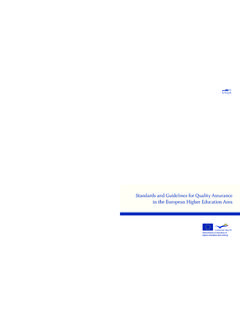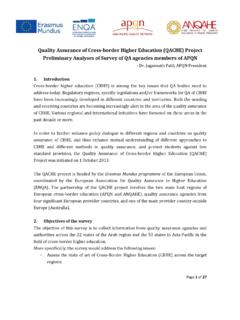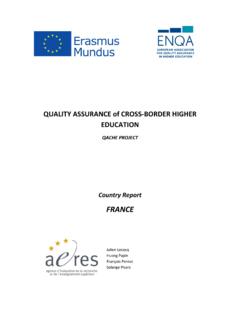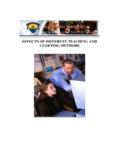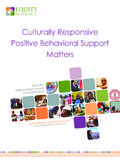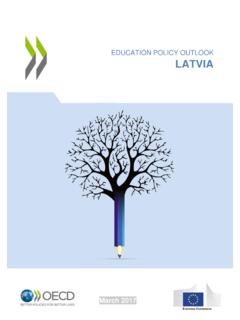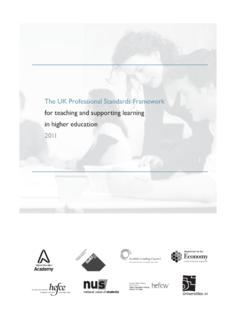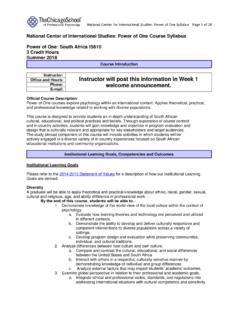Transcription of Workshop report - ENQA
1 Workshop report 17. This report is based on the ENQA Workshop on the theme Quality Assurance and learning Outcomes that was held in September 2010 in Vienna, Austria. Lena Adamson, Mar a Becerro, Peter Cullen, Laureano Gonz lez-Vega, The Workshop addressed the question of what stakeholders expect from quality Juan Jos Sobrino, Norma Ryan assurance agencies in connection with learning outcome orientation. The opportunities and challenges of the learning outcome orientation in the higher education sector were discussed from different perspectives. The Workshop tried to define the role that learning outcomes should play in external quality assurance and Quality Assurance and learning Outcomes how they can or should be considered within the scope of external quality assurance.
2 Workshop report 17. ISBN 978-952-5539-57-8 (Paperbound). ISBN 978-952-5539-58-5 (PDF). ISSN 1458-106X. Workshop report 17. Lena Adamson, Mar a Becerro, Peter Cullen, Laureano Gonz lez-Vega, Juan Jos Sobrino, Norma Ryan Quality Assurance and learning Outcomes 2. This project has been funded with support from the European Commission in the framework of the Lifelong learning programme. This publication reflects the views of the authors only and the Commission cannot be held responsible for any use which may be made of the information contained therein. ISBN 978-952-5539-57-8 (paperbound).
3 ISBN 978-952-5539-58-5 (pdf). ISSN 1458-106X. The present report can be downloaded from the ENQA website at European Association for Quality Assurance in Higher Education 2010, Helsinki Quotation allowed only with source reference. Cover design and page layout: Eija Vierimaa Edited by Maria Stalter Helsinki, Finland, 2010. 3. Table of contents Foreword .. 4. Chapter 1: On quality assurance and learning outcomes: Evaluating students' work within institutions or institutional work with students?.. 5. 5. Levels of learning outcomes the Bologna 6. The proposed model 6.
4 Assessing and evaluating learning outcomes moving closer to 7. Assessing or evaluating intended learning outcomes and aligned 7. Assessing or evaluating achieved learning 9. Chapter 2: learning outcomes in external quality assurance: The case of Spain. 12. 12. Where are learning outcomes integrated in the Spanish accreditation process? ..13. What are the results of the Spanish ex-ante accreditation procedure? Next steps concerning learning outcomes?..14. Chapter 3: Determining whether intended learning outcomes meet subject- specific and academic and/or professional Meaning of Intended learning Outcomes (ILOs) versus Expected learning Outcomes (ELOs) versus Actual learning Outcomes (ALOs).
5 17. Mapping of Intended learning Outcomes to European or National Qualifications Frameworks and any (other) legally binding 18. Need to acknowledge the implications of uncertainty of such mappings different experts may have different Mapping (benchmarking) of ILOs against other internationally well-accepted standards for that subject or 20. Mapping ILOs in emerging 20. Panel functionality: needs to be able to work as 20. Scrutinising Intended learning Outcomes ( statements about knowledge, skill and competence) in the context of 20. Chapter 4: Which requirements should the formulation of learning outcomes meet?
6 22. 22. Experiences in implementing a learning Outcomes Approach . University College Cork: A case 23. 25. Annex 26. 4. Foreword learning outcomes are described as written statements of what a learner is expected to know, understand and/or be able to do at the end of a period of learning . At the beginning of the 90s, a EU pilot project on ECTS showed that study programmes were much easier to compare if they were described in terms of outcomes, instead of inputs. learning outcomes started to gain importance at policy level and have consequently been supported by the development of national qualifications frameworks (Berlin Communiqu ), the adoption of the ESG, the overarching outcomes-focused Qualifications Framework of the European Higher Education Area (QFEHEA) (Bergen Communiqu ) and the European Qualifications Frameworks for Lifelong learning .
7 Today and in the near future student-centered learning and learning outcomes will be at the core of implementing Bologna'. The importance of learning outcomes will increase for several reasons. Firstly, learning outcomes make qualifications more transparent for students. Then, the range of graduates is becoming wider and thanks to learning outcomes, employers may have a better understanding of the acquired knowledge, skills and competences in order to recruit the most suitable candidate. learning outcomes benefit for quality assurance as they increase transparency and comparability between qualification standards.
8 learning outcomes are also valuable in terms of course design. Naturally, objections have also been expressed with regard to student-centred learning and learning outcomes. They mainly question the focus on the individual learner, the difficulties in the formulation and implementation, and the inappropriate approach to higher education and academic study. The results of an ENQA survey on quality procedures of quality assurance agencies across Europe and beyond (2008). witnessed the education's shift from a teaching to a learning focus. At the same time this survey revealed that learning outcomes have only started to be addressed in external quality assurance at programme and institutional level procedures.
9 Since then, the methods of agencies take more and more into account learning outcomes. This report presents four articles based on the ENQA Workshop on the theme Quality Assurance and learning Outcomes that was held in September 2010 in Vienna, Austria. The Workshop addressed the question of what stakeholders expect from quality assurance agencies in connection with learning outcome orientation. The opportunities and challenges of the learning outcome orientation in the higher education sector were discussed from different perspectives. The Workshop tried to define the role that learning outcomes should play in external quality assurance and how they can or should be considered within the scope of external quality assurance.
10 Achim Hopbach President European Association for Quality Assurance in Higher Education (ENQA). 5. Chapter 1: On quality assurance and learning outcomes: Evaluating students' work within institutions or institutional work with students? Lena Adamson, Royal Institute of Technology (KTH), Sweden Introduction In September 2009, a new model for quality assurance (QA) was presented to the Swedish Government by the National Agency for Higher Education (NAHE). The model was based on learning outcomes and will constitute the base for this article, although the model as such will not be implemented in The article is structured around the following topics: a) definitions and levels for learning outcomes; b) a brief introduction to the Swedish model; and c) suggested models and principles for evaluating intended and achieved learning outcomes.
